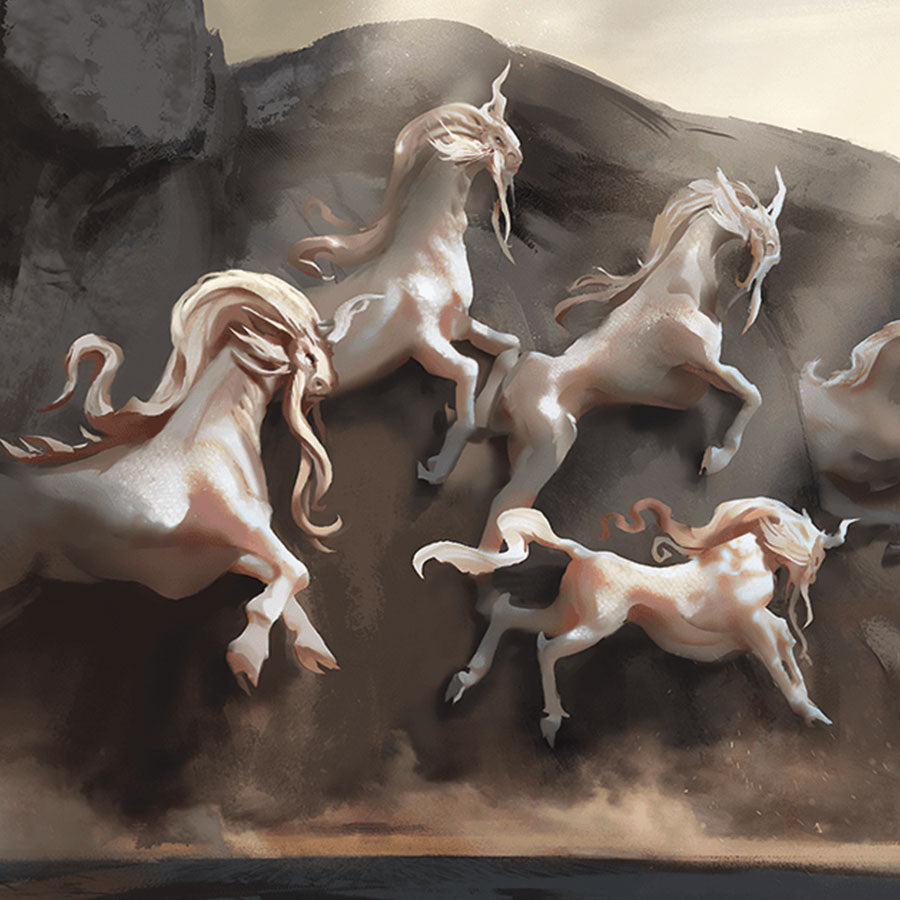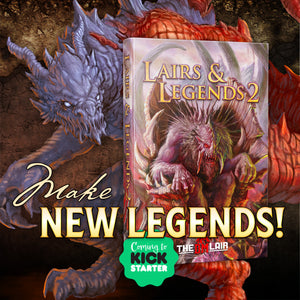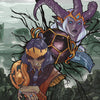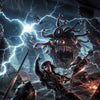Avoid These 7 D&D Character Creation Mistakes

Written by Luke Hart
This article isn’t about creating the ultimate build that will frustrate your dungeon master, make them want to quit, and generally ruin the game for the other players—there are already enough articles and videos like that out there. It isn’t about maximizing damage output, or survivability, or how exploit a chink in the game that honestly should have been discovered in playtesting that allows you to summon 100 zombies and lead the greatest undead army the world has ever seen—all while your fellow players watch from the sideline and feel rather useless.
No, this article isn’t talking about YOUR fun today—or at least what you THINK is fun, or what looks fun ON PAPER, until you discover in practice that using Consecration to instantly kill everything in the dungeon isn’t nearly as much fun as, oh I don’t know, actually playing the game.
Instead, we’re going to explore how to make characters that are FUN FOR YOU, but also enable GREATER FUN for the other players and the game master. Because when fun is maximized for EVERYONE at the game table, I think we’ll find it outlives cheap thrills.
Today, we’re talking about how you should NEVER make a D&D character, things you should generally avoid in character creation, and what to do instead.
Watch or listen to this article by clicking the video below.
#1 Never Be a Blacksmith
Or a farmer, or a lawyer, or a shopkeeper, or—well, anyone who’s not an adventurer. This point could also be re-stated as “Don’t be useless.” At least, you know, in the context of a D&D game where your role is to delve into dungeons and other dangerous places and your skill with a sword or wand or holy symbol or thieves tools will mean the difference between life and death.
However, of course you’re not one of those things because the Player’s Handbook forces you to pick a class that builds in at least some semblance of utility. So, unless you totally blow it, chances are you’re going to be more competent than a farmer with a hoe or a shopkeeper with shotgun. No, wait, scratch that last one. Let’s go with lawyer with briefcase instead.
But having a class and some starting equipment—the D&D equivalent of drawing breath—doesn’t mean you’re not useless. You see, a good character FULFILLS A VALUABLE ROLE for the team. So, if the group already has three rogues, are you sure they need a fourth? Sure, rogues are the trappers and life expectancy may be rather short, but remember, this is D&D 5e. The chances of one rogue, let alone three, dying is almost nonexistent. Of course, if you’re playing Shadowdark or Pathfinder 2…yeah, maybe you need some redundancy.
But my point here is that the decision of which class you play shouldn’t be made in a vacuum. Instead, discuss your character ideas with your fellow players, and work together to assemble a party of characters COLLABORATIVELY. When players talk with each other and create characters as a team, I think you’ll find that overall game enjoyability for everyone increases.
Some other considerations: Don’t force a player to fill the same role—such as the often-despised role of healer—over and over again unless they really want to. Furthermore, would it kill you to offer to fill a role that other players’ don’t want to fill. Look, healers aren’t that bad. Trust me, when you have the barbarian, paladin, wizard, and rogue all practically BEGGING YOU for healz, there is no greater since of superiority. Which, by the way, can be leveraged into infernal pacts and contracts of all sorts.
Creating characters collaboratively doesn’t mean, of course, that you can’t have secrets or details about your character that will make them interesting for you to play. My friend Joe is a cleric tank in our Pathfinder 2 game, and the two spells he uses the most are heal and thorns—the latter, by the way, is a real gem. He mostly strides into melee, casts Thorns, gets the living snot beat out of him, heals himself, and rinses and repeats. But the way he roleplays his characters’ personality and what he says—things that often leave the entire table dying with laughter and unable to breath—seem to be part of what he enjoys the most.
#2 Don’t Be an Edgelord Loner
Almost everyone hates the loner. The player who at every opportunity sneaks off on his own to play his own private game of D&D that none of the other players are invited to. The other players, instead of playing, are sidelined and must wait for the loner and game master to play out whatever is going on over there.
Meanwhile, the game master is forced to run two games instead of one, and the competent game master will make a point to swap back and forth between what the loner is doing and what the other players are doing so that both narratives are progressing. All round, this creates undo stress and extra work for the GM, and results in a less enjoyable game for most of the players.
Now, if you want to play a character with a dark, complex backstory filled with tragedy and betrayal, please do. This can provide a great opportunity for rich roleplaying. However, don’t do it just because you want to stand out in the group, steal the spotlight for yourself, or test the boundaries of that the dungeon master and other players are willing to tolerate.
It’s important to remember that we’re playing a GROUP game, all of us together, at the same table. Your character creation and roleplaying decisions should take the GROUP into consideration. I tend to be a very chaotic player—a chaos gremlin as they call them—and am want to do any number of ill-advised things during a game. However, if I allow my whims full reign, I’ll be crapping all over everyone else’s game. So, when I’m a player, I must always remind myself to keep my base impulses under control. Remember, our your fun is important, but so is everyone else’s.
#3 Don’t Be a Pacifist
Or a murder hobo or the bard who turns every social interaction into two hours of talky talky while everyone else falls asleep at the table. Of course, any of those choices might be perfectly fine, in the right group, with the right playstyle. And that’s my point really. Know your group’s playstyle and make your character appropriately.
If the group is combat focused and you’ll be delving into a dungeon your GM has warned you will be full of dangerous baddies, don’t make a pacifist or a character who wants to turn every encounter into a social challenge. If the group loves the talky-talky bits of the game, don’t make a combat monster that has no value in social situations and just wants to bare steel and trade blows. If the group wants to make a bunch of super stealthy characters because you’re running an espionage campaign, don’t make a heavily armored noise machine—you know, a paladin.
But what if YOU don’t want to play the game that everyone else wants to play? Well, that’s the beauty of the thing: there are SO MANY GAMES OUT THERE, you can probably find what you’re looking for. Hop on sites like Start Playing, or check out the LFG channel on my Discord, or start your own game and be the game master. Run the exact type of game you want!
#4 Everyone Hates the Comedian
At least in a game that’s supposed to be dark and gritty. Nothing ruins the moment as much as a silly quip when a Xenomorph is about to eat your face off in a game of Mothership. Or maybe silly quips in the face of overwhelming odds and certain death is exactly what MAKES THE MOMENT in your game.
Some games are serious, others are a thousand laughs a minute, and yet others are both or neither. The question is WHAT is the TONE of the game, and how can you make a character that fits that tone? Many times you can sense what the tone of a game is intended to be, but if that’s ever in question, you can always just ask. Ask the game master. Ask the players. “What tone are we trying to hit here, guys? Am I ruining the moment every time I blow kisses at the Xenomorph that just killed one of your characters?”
And when in doubt, you can’t go wrong with leaning toward the core tone instead of diverging from it. If your GM is going for a tense, horror atmosphere where characters are likely to die, and you’re not sure if a happy-go-lucky gnome barbarian who rages because she’s ticklish will fit in or not—err toward not, at least in this case.
#5 Don’t Be a Druid
If the game is going to take place in a massive, cosmopolitan city. Especially if your druid prefers animals to people and despises civilization. If the game focuses on eldritch horror and preventing the looming end of the world, perhaps you SHOULDN’T make a character that serves the Great Old Ones. And before you make a character that specializes in fighting undead, perhaps you should make sure the GM plans to use undead as a major part of the campaign.
My point here—besides crapping on druids, warlocks, and vampire hunters—is that you should consider the THEME of the campaign and create a character based on that information. Your game master probably won’t give you too many specifics about the campaign lest they spoil things, but they should give you enough high-level information to inform character creation decisions.
By the way, you may be noticing a THEME to many of my points thus far: don’t create a character in isolation; instead, conspire with your fellow players and game master. When you work together, even in a minor way, the game is improved for everyone.
#6 Don’t Sacrifice Yourself
With all of this talk about OTHER PEOPLE and the GROUP and the GAME MASTER, you might think I’m telling you that what YOU want to do is unimportant. And it’s not. Just as much as I tell dungeon masters to only run games THEY want to run and that THEY will find enjoyable, you should only play a character you’ll have fun playing. Yes, you want to consider everything that we’ve already discussed, but if you do all that and HATE your character and HATE playing the game, then nobody wins. The trick is finding the sweet middle ground where both you and everyone else can be happy.
Of course, the possibility exists that that middle ground doesn’t exist. What you want to do just doesn’t work with the group or the campaign the GM is running. It happens. Don’t feel bad. And if that happens, I’d suggest trying to find a more suitable game instead of trying to force the proverbial round peg into a square hole.
#7 Never Create a Character Backstory Just for Yourself
In fact, if you want to know how to NEVER create a backstory, and what to do instead, check out this video right here. And don’t forget to pick up Lairs & Legends at the link below. Get over 700 pages of D&D fifth-edition resources for your games! And until next time, happy game mastering!
100 Years of GM Experience at Your Fingertips!
Are you a NEW GAME MASTER feeling a bit overwhelmed by everything involved with running a role-playing game? Are you a VETERAN GAME MASTER looking for new tips and tricks to take your games to the next level? Look no further than the Secret Art of Game Mastery.
We at the DM Lair have distilled our CENTURY of accumulated GM experience into an easy-to-read guide of practical advice that you can immediately apply to your games! We've even included our own templates–the things that we use to prepare our ACTUAL games.
Get all three books to master your game:
- The Secret Art of Game Mastery. Contains over 100 years of GM advice distilled into an easy-to-read format. It introduces and explains the tools of the trade, scheduling, playstyle, post-game notes, getting player feedback, and more.
- The Secret Art of Preparation. Brings to your fingertips the actual templates and guides that the DM Lair team uses to prepare games, Lair Magazine, and more. Designed as a three-ring binder, it's intended for you to write directly into for your entire campaign!
- The Secret Art of Notetaking. Gives you the keys to tracking your campaign from session to session just like the DM Lair team. Designed as a three-ring binder, it's intended for you to write in and keep track of your whole campaign!
With so much knowledge and experience on its pages, The Secret Art of Game Mastery is guaranteed to become an indispensable tool for all game masters, new and veteran alike. And if that isn’t enough, the information applies to all game systems and all genres!
-
Posted in
Game Master How-To Articles







